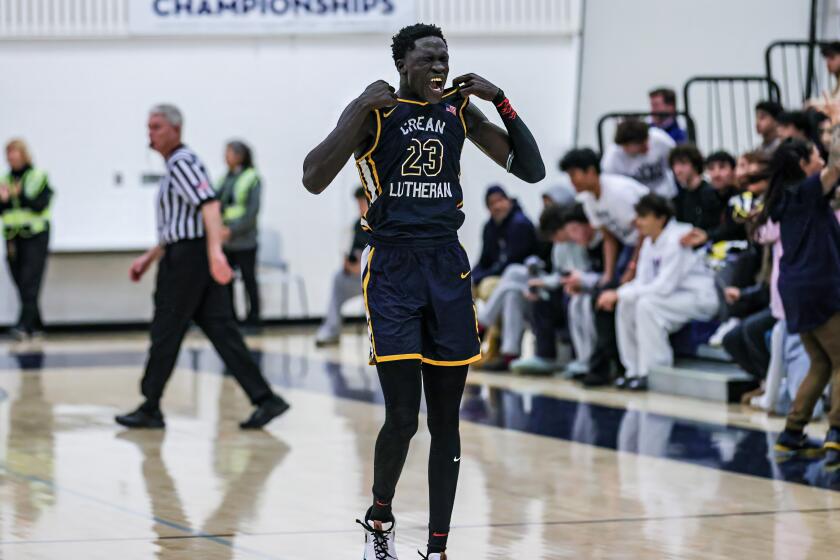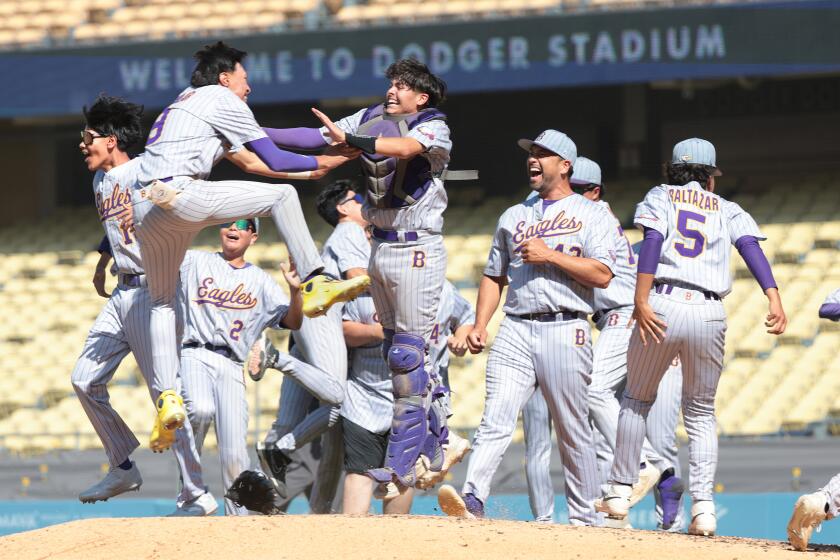Controversy 101
- Share via
This marks the last season of the bowl championship series as we know it but, unfortunately for its many critics, not the end of the BCS.
The controversial mechanism for sorting college football’s complicated business limps into its eighth season, with a new four-year cycle to begin in 2006.
A patch-work answer for a sport that has refused to embrace a playoff, the BCS was created in 1998 to free teams from their historical bowl ties and allow for a No. 1 vs. No. 2 title-game match-up.
A standings formula was created to rank the teams, designate schools for major bowl destinations and secure guarantee access spots for schools outside the six major conferences.
The BCS formula has been adjusted several times, but in only three of seven previous seasons has the BCS emerged relatively unscathed.
Those years were 1998 (Tennessee vs. Florida State in the Fiesta Bowl); 1999 (Florida State vs. Virginia Tech in the Sugar Bowl) and 2002 (Miami and Ohio State in the Fiesta).
In 2000, the BCS designated Oklahoma to play Florida State in the Orange Bowl for the national title even though Miami was No. 2 in the Associated Press and coaches’ polls and beat Florida State that year.
After the 2001 season, Miami and Nebraska met in the Rose Bowl despite the fact Nebraska did not win its division in the Big 12 Conference, was routed in its last game by Colorado, and Oregon finished No. 2 in both human polls.
In 2003, USC finished No. 1 in both polls but No. 3 in the BCS standings, resulting in Louisiana State winning the BCS title and USC the Associated Press championship.
Last year, USC and Oklahoma finished first and second in the BCS, with unbeaten Auburn crying foul and California being denied its first Rose Bowl bid since 1959 because it finished behind Texas in the BCS despite finishing ahead of Texas in the writer’s and coaches’ polls.
Where does that leave us?
Despite another whirlwind off-season, the BCS system remains relatively unchanged.
Last year, the standings formula gave equal weight to the human polls and a computer component.
It’s the same format this year, with a few twists:
Citing conflict of interest concerns, Associated Press pulled its poll out of the BCS. It was replaced by the Harris Interactive College Poll, a panel of 114 former coaches, administrators, players and media members.
The Harris poll will debut Sept. 25 while the AP will independently crown its champion.
Unlike the AP, though, only the final ballots of Harris voters will be made public.
The coaches’ poll returns without the co-sponsorship of ESPN. The major change is that the voting coaches, who for years voted in secret, will now reveal their final ballots.
The same six computer rankings will be used in the BCS standings: Anderson & Hester, Billingsley, Colley Matrix, Massey, Sagarin and Wolfe.
The Rose Bowl hosts this year’s BCS national title game, on Jan. 4, completing an eight-year rotation that also includes the Sugar, Orange and Fiesta bowls.
Next year, Fox begins a four-year deal in which it will broadcast the Fiesta, Sugar and Orange bowls but not the Rose, which will remain on ABC.
Next year also marks the start of the “double-hosting” format, in which the four major bowls take one turn hosting their game each year and then, about a week later, the BCS national title game in the same stadium.
The extra game was added to create more at-large BCS access opportunities for the five conferences outside the BCS structure.
The Fiesta Bowl is first bowl up in double-hosting, with the Rose Bowl getting two games in 2009.
The soonest there could be a playoff in college football is 2010, although the prospects are unlikely as college presidents and BCS officials fear a playoff would cripple the game’s historic bowl structure.
This year, 56 of the 119 major college schools will play in bowl games.
“A playoff structure would erode the base of the bowls,” BCS Commissioner Kevin Weiberg recently said. “There’s a tremendous difference between a playoff structure and a bowl structure.”
*
(BEGIN TEXT OF INFOBOX)
BCS title games
*--* 2005 ORANGE BOWL
*--*
USC 55, OKLAHOMA, 19
After Oklahoma took a 7-0 lead, USC scored four consecutive touchdowns and the rout was on. Matt Leinart threw five touchdown passes, including three to Steve Smith, and the Trojan defense intercepted three passes.
*--* 2004 SUGAR BOWL
*--*
LOUISIANA STATE 21, OKLAHOMA 14
Freshman Justin Vincent ran for 117 yards with a touchdown, leading LSU to a victory at the Superdome and a share of the national championship. LSU earned the title from the coaches, who were obligated to vote the winner of the Sugar Bowl the national champion. LSU ended up sharing the national championship with USC (12-1), which -- despite not receiving a bid to the BCS title game -- finished No. 1 in the Associated Press poll.
*--* 2003 FIESTA BOWL
*--*
OHIO STATE 31, MIAMI 24
Ohio State (14-0) worked two overtimes to win the championship from a favored Hurricane team that had not lost in 34 games. Maurice Clarett ran five yards for the winning touchdown, and Ohio State’s defense turned back a final Miami bid to tie the score.
*--* 2002 ROSE BOWL
*--*
MIAMI 37, NEBRASKA 14
Hurricane sophomore wide receiver Andre Johnson racked up 199 yards and two touchdowns on seven receptions to win co-MVP honors with quarterback Ken Dorsey as Miami (12-0) finished undefeated. The Cornhuskers finished 11-2.
*--* 2001 ORANGE BOWL
*--*
OKLAHOMA 13, FLORIDA STATE 2
Under second-year Coach Bob Stoops, the Sooners (13-0) were 10 1/2 -point underdogs and scored the lone touchdown -- by Quentin Griffith -- with 8:30 to play.
*--* 2000 SUGAR BOWL
*--*
FLORIDA STATE 46, VIRGINIA TECH 29
Bobby Bowden’s only undefeated season (12-0) culminated in New Orleans. Peter Warrick caught six passes for 163 yards and a touchdown and also returned a punt for a score for the Seminoles.
*--* 1999 FIESTA BOWL
*--*
TENNESSEE 23, FLORIDA STATE 16
Volunteer receiver Peerless Price was the MVP with four receptions for 199 yards, including a 79-yard fourth-quarter touchdown from quarterback Tee Martin. Tennessee finished 13-0, Florida State 11-2.
*--* FUTURE SITES
*--*
Year reflects regular season:
* 2005...Rose Bowl, Jan. 4, 2006
* 2006...Fiesta Bowl
* 2007...Sugar Bowl
* 2008...Orange Bowl
* 2009...Rose Bowl
More to Read
Go beyond the scoreboard
Get the latest on L.A.'s teams in the daily Sports Report newsletter.
You may occasionally receive promotional content from the Los Angeles Times.











